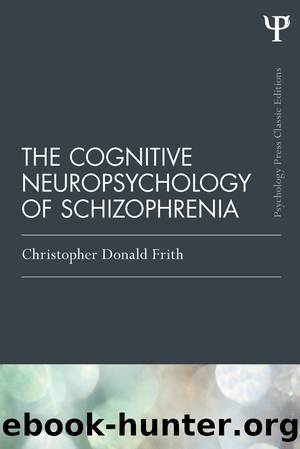The Cognitive Neuropsychology of Schizophrenia by Christopher Donald Frith

Author:Christopher Donald Frith
Language: eng
Format: epub
ISBN: 9781317608295
Publisher: Psychology Press
Self-monitoring and memory for action
Self-monitoring of speech can be studied directly by asking people to remember whether they said something or not. Richard Bentall and his colleagues (Bentall et al., 1991a) asked patients either to generate category items (a fruit beginning with T) or to read out category items (a country—Norway). A week later they were asked to identify the source of these items and some similar new items. Thus for each item (e.g. tomato, Norway, tiger) they had to decide whether they had generated it (tomato), whether it had been given (Norway), or whether it was new (tiger). It was predicted that hallucinating patients would have difficulty distinguishing what they had generated from what had been provided by the experimenter. Psychotic patients were worse than normal volunteers at this task, whether or not they had hallucinations. Hallucinating patients were slightly more likely to misattribute to the experimenter items they had generated themselves.
I have carried out a very similar experiment as part of a survey of all the schizophrenic patients in the Harrow area (Frith et al., 1991b). Patients were asked to generate category items (e.g. animals) and then listened while the experimenter read out more items in the same category. Ten minutes later the patient was asked to decide whether items were self-generated, experimenter-generated or new. Contrary to expectation, it was the incoherent and incongruous patients who were poor at distinguishing self-generated and experimenter-generated items, while this ability was unrelated to the presence of hallucinations.
Incoherent patients perform poorly on this task because it involves source memory as well as self-monitoring. I have suggested that incoherent patients behave in many ways like patients with frontal lobe lesions (Chapter 4). Source memory is impaired in patients with frontal lobe lesions (e.g. Janowsky et al., 1989), but this is because the patient cannot remember the external source of the material.
In order to use the methodology described by Bentall et al. (1991a) and Frith et al. (1991b) for the study of self-monitoring as distinct from source memory, it will be necessary to contrast two different source memory tasks. In one task subjects have to distinguish between two external sources, while in the other they must distinguish between an internal and an external source. Hallucinating patients should be impaired on the latter task relative to the former.
Harvey (1985) has used precisely this design, but he was studying thought disorder rather than hallucinations. In one task two experimenters alternately read out a series of words. Subjects had to remember which experimenter had said each word. This task requires memory for two external sources. In the second task subjects had to read out a series of words or to imagine themselves saying another series of words. Subsequently they had to remember which words had been thought and which spoken.
Harvey found that thought-disordered schizophrenic patients had more difficulty in discriminating what they had thought from what they had said in comparison to other psychotic patients and normal people. These patients were not impaired in distinguishing the two external sources in task 1.
Download
This site does not store any files on its server. We only index and link to content provided by other sites. Please contact the content providers to delete copyright contents if any and email us, we'll remove relevant links or contents immediately.
Should I Stay or Should I Go? by Ramani Durvasula(6779)
Why We Sleep: Unlocking the Power of Sleep and Dreams by Matthew Walker(5636)
Fear by Osho(4083)
Flow by Mihaly Csikszentmihalyi(4047)
Rising Strong by Brene Brown(3777)
Why We Sleep by Matthew Walker(3767)
Too Much and Not the Mood by Durga Chew-Bose(3689)
How to Change Your Mind by Michael Pollan(3668)
The Hacking of the American Mind by Robert H. Lustig(3575)
Lost Connections by Johann Hari(3451)
He's Just Not That Into You by Greg Behrendt & Liz Tuccillo(3298)
Evolve Your Brain by Joe Dispenza(3045)
What If This Were Enough? by Heather Havrilesky(2943)
Resisting Happiness by Matthew Kelly(2881)
Crazy Is My Superpower by A.J. Mendez Brooks(2856)
The Courage to Be Disliked by Ichiro Kishimi & Fumitake Koga(2791)
The Book of Human Emotions by Tiffany Watt Smith(2767)
Descartes' Error by Antonio Damasio(2728)
In Cold Blood by Truman Capote(2677)
